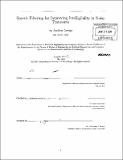Speech filtering for improving intelligibility in noisy transients
Author(s)
Lewine, Andrew (Andrew P.)
DownloadFull printable version (12.91Mb)
Other Contributors
Massachusetts Institute of Technology. Dept. of Electrical Engineering and Computer Science.
Advisor
Rahul Sarpeshkar.
Terms of use
Metadata
Show full item recordAbstract
Hearing impairment is a problem that affects a large percentage of the population. Cochlear implants allow those with profound or total hearing loss to regain some hearing by stimulating auditory nerve fibers with implanted electrodes, in response to sound picked up by an external microphone. The signal processing chain from microphone input to stimulation output is an important factor in the overall speech intelligibility of the implant system. This thesis work improves on an existing ultra-low-power cochlear implant system by utilizing an improved noise and power efficient bandpass filter bank to implement a novel frequency-selective gain control algorithm capable of reducing, and in some cases removing, loud transient noises, thereby improving speech intelligibility. This gain control algorithm takes advantage of the inherent frequency-specific gain control afforded by the improved bandpass filter topology. This contribution makes an improvement to the existing state-of-the-art system in both power efficiency and performance.
Description
Thesis (M. Eng.)--Massachusetts Institute of Technology, Dept. of Electrical Engineering and Computer Science, 2011. Cataloged from PDF version of thesis. Includes bibliographical references.
Date issued
2011Department
Massachusetts Institute of Technology. Department of Electrical Engineering and Computer SciencePublisher
Massachusetts Institute of Technology
Keywords
Electrical Engineering and Computer Science.